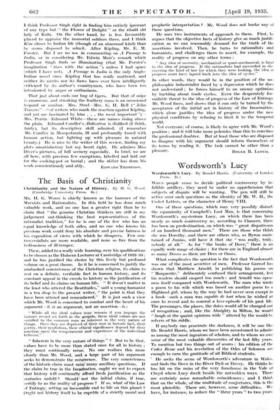The Basis of Christianity
Christianity and the Nature of History. By H. U. Wood. (Cambridge University Press. 6a.) MR. II. G. Woon is chiefly known as the hammer of the Marxists and Rationalists. In this field lie has done much valuable work, and no one has a greater right than he to claim that " the genuine Christian thinkers are still in my judgement out-thinking the best representatives of the rationalist tradition," for he is one of the few who has an equal knowledge of both sides, and no one who knows his previous work could deny his absolute and precise fairness in his exposition of views with which he disagrees. Few con- troversialists are more readable, and none so free from the tediousness of ill-temper.
These, added to a really wide learning, were his qualifications to be chosen as the Hulsean Lecturer at Cambridge of 1933-34 ;
and he has justified the choice by this lively but profound volume on a great theme. In -it he is concerned to justify the
unabashed concreteness of the Christian religion, its claim to rest on a definite, verifiable fact in human history, and its constant appeal in the creeds to history, as the justification of its belief and its claims on human life. " It doesn't matter in the least who uttered the Beatitudes," said a young humanist in a tea shop to the present writer,-" the point is that they have been uttered and remembered." It is just such a view which Mr. Wood is concerned to combat and the heart of his argument—it is an argwnent, not an assertion—is :
" While all the ideal values. :may' remain if you impugn the historic record set forth in the these. ideal values arena certified to the common man as inherent m the very.nature of things. Once they are deprived of their root in historic fact, their poetry, their symbolism, their ethical significance depend 'for thc•r sanction upon the temperament and experience of the individual believer."
" Inherent in the very nature of things " ? But to be that, values have to be more than stated once for all in history ;
they must continually recur. No one realizes this more -clearly than Mr. Wood, and- a large part of his argument seeks to demonstrate the reetiirence. The very concreteness of the historic claim must raisa-many ancillary questions. If
the claim be true in the Incaiimition, ought we not to expect that histdry will continually afford fresh justification as the centuries unfold ? Should- not the initial claim, if true, certify- to us the reality:of progress? If so, what of the Law of Entropy, setting an inexorable end to life on this planet ? Ought not history: itself to be capable of a strictly moral and
-•prophetic interpretation.? Mr.- Wood does not burke- any of these questions.
He uses two instruments of approach to them. First, he argues that the objective facts of history give as much justifi- cation as we can reasonably demand for the truth of the assertions involved. Then, he turns to rationalists and humanists, and challenges them to assert, for example, the reality of progress on any other terms :
" Any idea of necessity, mechanical or quasi-mechanical, is fatal to the idea of progress. If the rationalists had succeeded in dis- covering the kind of law for which they were looking, the idea of progress must have lapsed back into the idea of cycles."
In other words, they would be in the position' of the MI- philosophic industrialist faced by a depression which he does not understand : he forces himself to an uneasy aptanism by burbling about trade cycles. Even the desperately for- midable threat to the idea of progress of the Law of EntrOpy Mr. Wood faces, and shows that it can only be turned by the acceptance of the initial act in history of the Incarnation,
which alone justifies the idea of progress under the new physical conditions by refusing to limit it to the tempciral world.
Not everyone; of course, is likely .to agree with Mr. Wood's position ; and it will take more polemics than this to convince the professional doubter. But at least those who are diSpoSed to disagree with his' argument should inform themselvek of • its terms by reading it. The task cannot be other than a






































 Previous page
Previous page